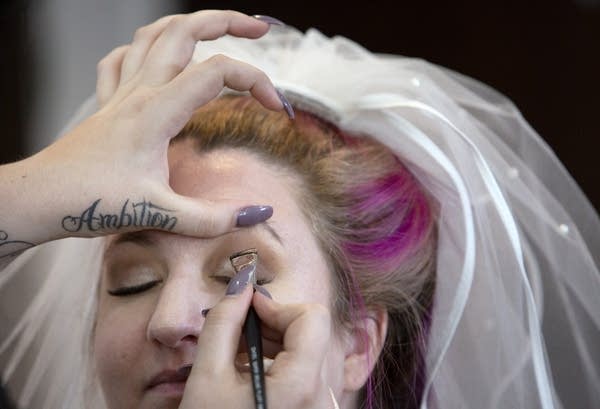Briana Bierschbach
A model sits in a chair wearing a flowing veil as makeup artist Lexi Tyrrell swirls around her, gently dabbing her face with a sponge while breaking down the best and worst times of day for lighting.
“What we do is focus solely on how the pictures are going to look,” she told two students sitting nearby, scribbling notes on a legal pad. “These are the one thing from her wedding day that she will have for the rest of her life.”
Tyrrell is an instructor at Faces Etc of MN, a professional makeup school in south Minneapolis.
It’s one of only a few schools in the state that trains people who want to get into makeup artistry but aren’t interested in full-blown cosmetology school, where students also have to learn other skills such as skin care and waxing. Many of the school’s hundreds of alumni work as freelance makeup artists and do on-site services for brides on their wedding day.
But they now say that work is being threatened under a new interpretation of state law that’s already put some freelancers out of business.

Last December, the Minnesota Board of Cosmetology, a state board that handles licensing and salon inspections, issued a bulletin that said anyone getting paid to do freelance hair and makeup for special events would need the same license as a manager of a salon, which requires thousands of hours of training in cosmetology. The freelancers would also need a special events permit, according to the board.
Since then, the board has sent cease-and-desist letters to makeup freelancers who don’t comply and fined others thousands of dollars.
“Some of our alumni were, what the board said, running an illegal salon,” said Debbie Carlson, who opened Faces Etc in 2007. “Our students, we tell them, you’re self employed, you’re not a store front, you’re not a salon, you can’t have people come to you. You go to them.”
Carlson and a group of other freelance hair and makeup artists have filed a complaint against the board in hopes of stopping the new regulations. The Minnesota Board of Cosmetology issued a statement saying it is aware of the complaint but declined further comment.

Attorney John Ella said others who do the same work don’t have to follow the new rules, including people who apply makeup behind counters at department stores. There’s also a loophole for people doing hair and makeup for a photoshoot, a television or film production or a play.
He said if the board had concerns about safety and training, they’d hold everyone applying for the services to the same standard.
“You don’t have to be licensed to do hair or apply makeup for a bridal magazine, but you do for a bride,” said Ella. “The basis for our claim is in part in the state and federal Constitution, under the Equal Protection Clause, there has to be a rational basis for government regulation, and we don’t think there is here, especially when you look at the many exceptions for people doing the exact same thing.”
The new restrictions come as demand for on-site wedding makeup and hair styling has boomed. Most brides don’t go into a salon on the day of their wedding any more, said Carlson, adding that they expect hair and makeup services at their venue.
Freelancers recently started organizing to push back on the new rules and estimate there are at least a thousand wedding and special event hair and makeup businesses operating around the state. Many think the board, which is made up of licensed cosmetologists and representatives from cosmetology schools, is trying to cash in on their growing business and others. The board has also recently tried to step up licensing and permitting on things such as hair braiding and eyelash extensions.
“It’s pure greed,” said Amy Reed, a freelance makeup artist who has stopped posting publicly about her wedding services for fear of getting fined or shut down. “They’re letting everyone else go out and do makeup, if you’re at a retail beauty counter, the Mary Kay lady, anyone else can be going out doing it, but they want the bridal business in their pocket.”
To become a licensed cosmetologist in Minnesota, many pay tens of thousands of dollars for training in everything from cosmetic hair, skin and nail care.
Ellyn Shun, a freelance makeup artist from Minnetonka, said she was only interested in doing makeup, which many programs don’t offer extensive training on.
“Just because I don’t have a passion to cut and style hair, or do hair and nails and facials, I’m pigeonholed to not be able to do anything,” she said. “It’s not fair in an industry that’s so broad and booming, people should have the right and opportunity to pursue that little niche and not do all or nothing.”
The freelancers hope the lawsuit will prompt the board to dial back or eliminate the new requirements, but if not, they’re also pushing for a change in state law.
Sen. Karin Housley, R-St. Mary’s Point, heard about the issue earlier this year after a constituent was put out of business by the new rules and another lost thousands of dollars in referrals.
She’s authored a bill to make the law clear that they don’t need that level of licensing. She wants quick action bill when the Legislature reconvenes in February.
“They changed the way they interpreted the law,” she said. “I’m going to make it clear that they can interpret it any way they want, but not for freelance hair and makeup stylists.”
